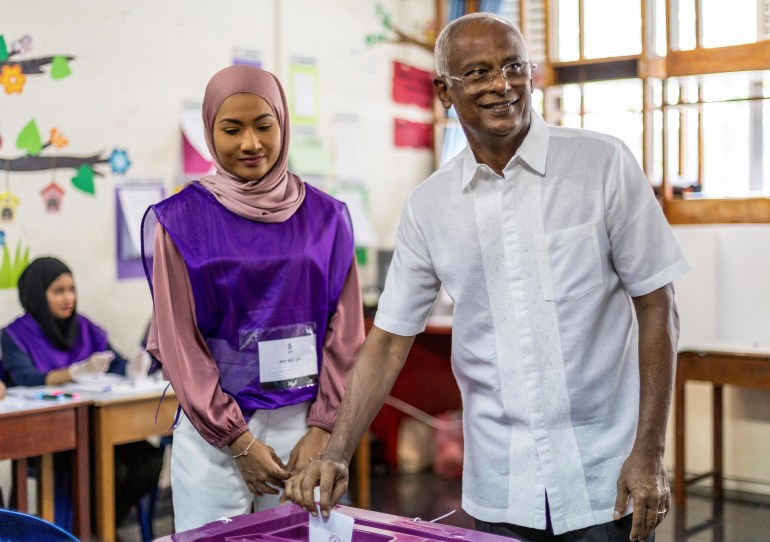Elections Commission of the Maldives shows Mohamed Muizzu winning 54 percent of ballots against incumbent Mohamed Solih in the second round after neither secured an outright victory earlier this month.
Maldives President Ibrahim Mohamed Solih has conceded defeat in a presidential run-off vote after an official count showed his rival Mohamed Muizzu in an impenetrable lead.
“Congratulations to president-elect Muizzu,” Solih wrote on X, formerly known as Twitter, after the Elections Commission of the Maldives showed his opponent winning 54 percent of ballots on Saturday.
“Thank you for the beautiful democratic example shown by the people in the elections,” he added. Official results are expected later on Sunday.
Muizzu, 45, emerged as the surprise frontrunner during the first round of voting on September 8, taking some 46 percent of the ballots cast. Solih – hurt by a low voter turnout and a split within his Maldivian Democratic Party (MDP) – won 39 percent.
The run-off was seen as having significant implications for the Maldives’s foreign policy, especially in deciding China and India’s battle for influence in the strategically located archipelago.

“Today’s result is a reflection of the patriotism of our people. A call on all our neighbours and bilateral partners to fully respect our independence and sovereignty,” a top official of Muizzu’s Progressive Party of Maldives, Mohamed Shareef, said according to the Associated Press news agency.
He told the news agency that it was also a mandate for Muizzu to resurrect the economy and the release of People’s National Congress party leader and former President Abdulla Yameen from prison.
Yameen is serving a prison term for corruption and money laundering, but his supporters say he has been jailed for political reasons. Muizzu had served as the housing minister for seven years and is currently the mayor of the capital Male.
Watchdog group Transparency Maldives said there had been some incidents of “electoral violence,” without specifying further details.
There were more than 282,000 eligible voters and turnout was 78 percent an hour before the polling stations closed.
Solih, 61, will serve as caretaker president until his successor is inaugurated on November 17.
India, China angle
Solih, who was first elected president in 2018, was battling allegations by Muizzu that he had allowed India an unchecked presence in the country. Muizzu is viewed as pro-China.
Solih has insisted that the Indian military’s presence in the Maldives was only to build a dockyard under an agreement between the two governments and that his country’s sovereignty will not be violated.
Muizzu promised that if he won the presidency, he would remove Indian troops from the Maldives and balance the country’s trade relations, which he claimed were heavily in India’s favour.
Ahmed Shaheed, a former foreign minister of the Maldives, termed the election verdict as a public revolt against the government’s failure to meet economic and governance expectations rather than concerns over Indian influence.
“I don’t think India was at all in the people’s minds,” Saheed said.
Solih suffered a setback closer to the election when Mohamed Nasheed, a charismatic former president, broke away from his Maldivian Democratic Party (MDP) and fielded his own candidate in the first round. He decided to remain neutral in the second round.
“Nasheed’s departure took the motherboard away from the MDP,” Shaheed said.
Yameen, leader of the People’s National Congress, made the Maldives a part of China’s Belt and Road Initiative during his presidency from 2013 to 2018. The initiative is meant to build railroads, ports and highways to expand trade – and China’s influence – across Asia, Africa and Europe.
Nevertheless, Muizzu is unlikely to change the foreign policy of affording an important place to India – rather, opposition to Chinese projects is likely to lessen, evening power balances out, Shaheed said.









